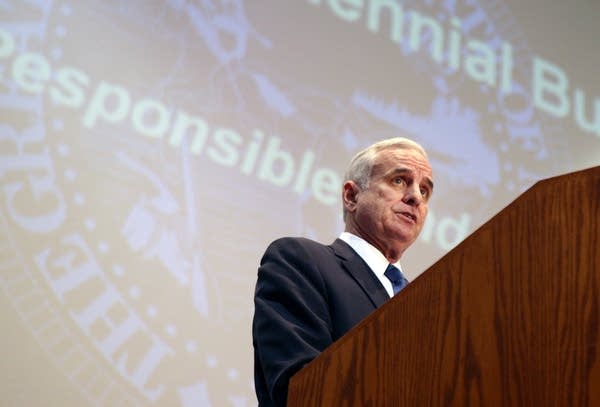Minn. Republicans target spending cuts to close deficit
Go Deeper.
Create an account or log in to save stories.
Like this?
Thanks for liking this story! We have added it to a list of your favorite stories.

Republicans in the Minnesota House and Senate have unveiled a two-year budget framework that would erase a $5 billion deficit entirely through spending cuts while also providing tax breaks to businesses and families.
GOP leaders released a list of spending targets Thursday that they stress will not increase taxes. The list does show significant spending cuts in social services, higher education and state aid to cities.
The House plan calls for total spending just shy of $34 billion, which is about $270 million less than a Senate framework put out earlier in the day.
Sen. Geoff Michel, R-Edina, said the targets confirm that state government can live within its means, which is about $34 billion in available revenue over the next two years.
Turn Up Your Support
MPR News helps you turn down the noise and build shared understanding. Turn up your support for this public resource and keep trusted journalism accessible to all.
"We're going to build a budget based on what is in Minnesota's checking account -- not what we wish was in the checking account," Michel said. "We're not going to ask more from taxpayers. We're not going to ask for more from families. We're not going to ask for more from businesses."
The GOP approach contrasts sharply to DFL Gov. Mark Dayton, who unveiled a budget proposal last month that relies heavily on tax increases and avoids deep spending cuts.
Like Dayton, Republicans want to protect funding for K-12 education and they would continue to delay a $1.3 billion payment to schools. But they scale back spending dramatically in several budget areas. Health and human services, higher education and state aid to cities and counties would take some of the biggest hits.

House Majority Leader Matt Dean, R-Dellwood, said human services would see a 5 percent spending increase, but that's far less than the growth of programs and eligibility. Dean said it's the most complicated target in the budget.
"Physicians, hospitals will see this," said Dean. "The chair's mission and goal would be is to try to protect direct care, safety-net care and nursing homes."
The spending details will start emerging next week, but Senate Republicans are already promising tax cuts for businesses.
In the House, Republicans are focused instead on a new proposal for $300 million in income tax cuts for low and middle-income families. House Speaker Kurt Zellers, R-Maple Grove, said helping families will help the economy.
"We thought letting the folks who actually earn the money keep a little bit," said Zellers. "They could put it towards new equipment. They could put it towards saving a little bit of money for the kids for college. They could put it toward paying for their food, clothes and their mortgage."
Democrats were quick to criticize the GOP targets, and they zeroed in on what they see as a $1.6 billion cut to Local Government Aid. House Minority Leader Paul Thissen, DFL-Minneapolis, said the cut will drive up local property taxes by double the amount of the proposed income tax relief.
"What you're seeing today is a classic example of misdirection," said Thissen. "They are putting money in the pockets of middle-class Minnesotans with one hand, while they're reaching into the other pocket of middle-class Minnesota families with the other hand and taking out double the money."
Gov. Dayton issued a statement saying the proposed Republican cuts would hurt school children, taxpayers, businesses and seniors.
During a meeting with firefighters earlier in the day, Dayton stressed the need to protect local governments and other programs. He said every dollar cut will affect Minnesotans.
"Somebody who's elderly, somebody who's disabled, somebody who needs police and fire protection, somebody who's depending on a quality education for their future," said Dayton. "This budget is about dollars and cents, but it's about our values and priorities, and then ultimately about peoples' lives."
Dayton urged Republicans to take their time putting together budget bills, and to listen to the people who will feel the impact of proposed cuts. House and Senate budget committees face a March 25 deadline.



